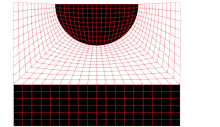
The third medium contact (TMC) is an implicit formulation for contact mechanics. Contacting bodies are embedded in a highly compliant medium (the third medium), which becomes increasingly stiff under compression. The stiffening of the third medium allows tractions to be transferred between the contacting bodies when the third medium between the bodies is compressed. In itself, the method is inexact; however, in contrast to most other contact methods, the third medium approach is continuous and differentiable, which makes it applicable to applications such as topology optimization.[1][2]
The method was first proposed by Peter Wriggers et al. where a St. Venant-Kirchhoff material was used to model the third medium.[3] This approach requires explicit treatment of surface normals. A simplification to the method was offered by Bog et al. by applying a Hencky material with the inherent property of becoming rigid under ultimate compression.[4] This property has made the explicit treatment of surface normals redundant, thereby transforming the third medium contact method into a fully implicit method. The addition of a new void regularization by Bluhm et al. further extended the method to applications involving moderate sliding, rendering it practically applicable[1]
References
- 1 2 Bluhm, Gore Lukas; Sigmund, Ole; Poulios, Konstantinos (2021-03-04). "Internal contact modeling for finite strain topology optimization". Computational Mechanics. 67 (4): 1099–1114. arXiv:2010.14277. Bibcode:2021CompM..67.1099B. doi:10.1007/s00466-021-01974-x. ISSN 0178-7675. S2CID 225076340.
- ↑ Frederiksen, Andreas Henrik; Sigmund, Ole; Poulios, Konstantinos (2023-10-07). "Topology optimization of self-contacting structures". Computational Mechanics. arXiv:2305.06750. doi:10.1007/s00466-023-02396-7. ISSN 1432-0924.
- ↑ Wriggers, P.; Schröder, J.; Schwarz, A. (2013-03-30). "A finite element method for contact using a third medium". Computational Mechanics. 52 (4): 837–847. Bibcode:2013CompM..52..837W. doi:10.1007/s00466-013-0848-5. ISSN 0178-7675. S2CID 254032357.
- ↑ Bog, Tino; Zander, Nils; Kollmannsberger, Stefan; Rank, Ernst (October 2015). "Normal contact with high order finite elements and a fictitious contact material". Computers & Mathematics with Applications. 70 (7): 1370–1390. doi:10.1016/j.camwa.2015.04.020. ISSN 0898-1221.